Author: flipside
Compiled by: TechFlow
1. Introduction
On-chain User Trends Towards 2025
2024 was a pivotal year for Web3 user growth, with the major public chains reaching historic highs in new users and super users. Chains like Base have redefined what exponential growth looks like, while Ethereum and its L2 solutions have demonstrated how entrenched ecosystems can adapt to evolving user demands.
However, deeper analysis of the data reveals that not all growth is created equal - highlighting the importance of focusing on quality, not just quantity, when assessing on-chain activity.
To that end, this report, based on Flipside's 2024 real-time on-chain crypto user data, introduces new, more actionable multi-variate metrics to evaluate this year's crypto activity, beyond just traditional performance indicators, to provide a fresh perspective on assessing the health of on-chain users in 2025.
Executive Summary
Beneath the headlines of user growth lies a deeper challenge: how to build ecosystems that create meaningful, sustained engagement, not just fleeting speculation.
In short, most blockchains are still in the early stages when it comes to converting ordinary users into high-value contributors.
User Acquisition:
Base: Set a record of 19.4 million new users acquired in October 2024, with Base contributing 13.7 million - nearly 8 times the second-place Polygon.
BTC: With BTC price hitting new highs above $100,000, Bitcoin's monthly user acquisition averaged just 935,900, indicating speculation among existing users rather than significant new user onboarding.
ETH: Averaged 1.56 million monthly user acquisitions, outpacing Arbitrum and Optimism, with a 33.4% quarter-over-quarter user growth in March. Notably, Arbitrum saw an outstanding single-month peak of 3.3 million new users in May.
Super User Trends:
Base: Attracted 15.1 million wallets that executed 100+ DeFi transactions, 38.4% more than Ethereum's 10.7 million super users.
ETH: 10.9 million DeFi-related super users exceeded the combined total of Arbitrum and Optimism (6.2 million and 1.8 million respectively), highlighting Ethereum's liquidity and accessibility advantages.
Polygon: Added 1.5 million new super users in 2024 and recorded 867.7 million super user transactions this year, underscoring its success beyond DeFi.
DEX Usage:
Uniswap: Expanded its dominance on major public chains, capturing 91.3% of new user DEX activity on Base, and grew its market share on Ethereum by 27.72% compared to 2023.
While Uniswap saw growth, Trader Joe maintained its leading position on Avalanche with a 61.1% market share, up 6.1% from 2023.
Unlike 2023, in 2024 the top 3 DEXes by new users and super users were consistent across all observed chains.
2. New User Acquisition
New user acquisition reached a monthly peak of 19.4 million in October 2024.
This year's on-chain user growth was led by Base, contributing 13.7 million new users in that month - nearly 8 times the second-place Polygon. Overall, it has been an impressive year for the entire on-chain user growth industry. User acquisition has maintained a steady upward trend throughout 2024, with only a slight pullback in August.
Note: "New Users" are defined as users who have made at least 2 transactions on a chain, with the second transaction occurring in 2024.
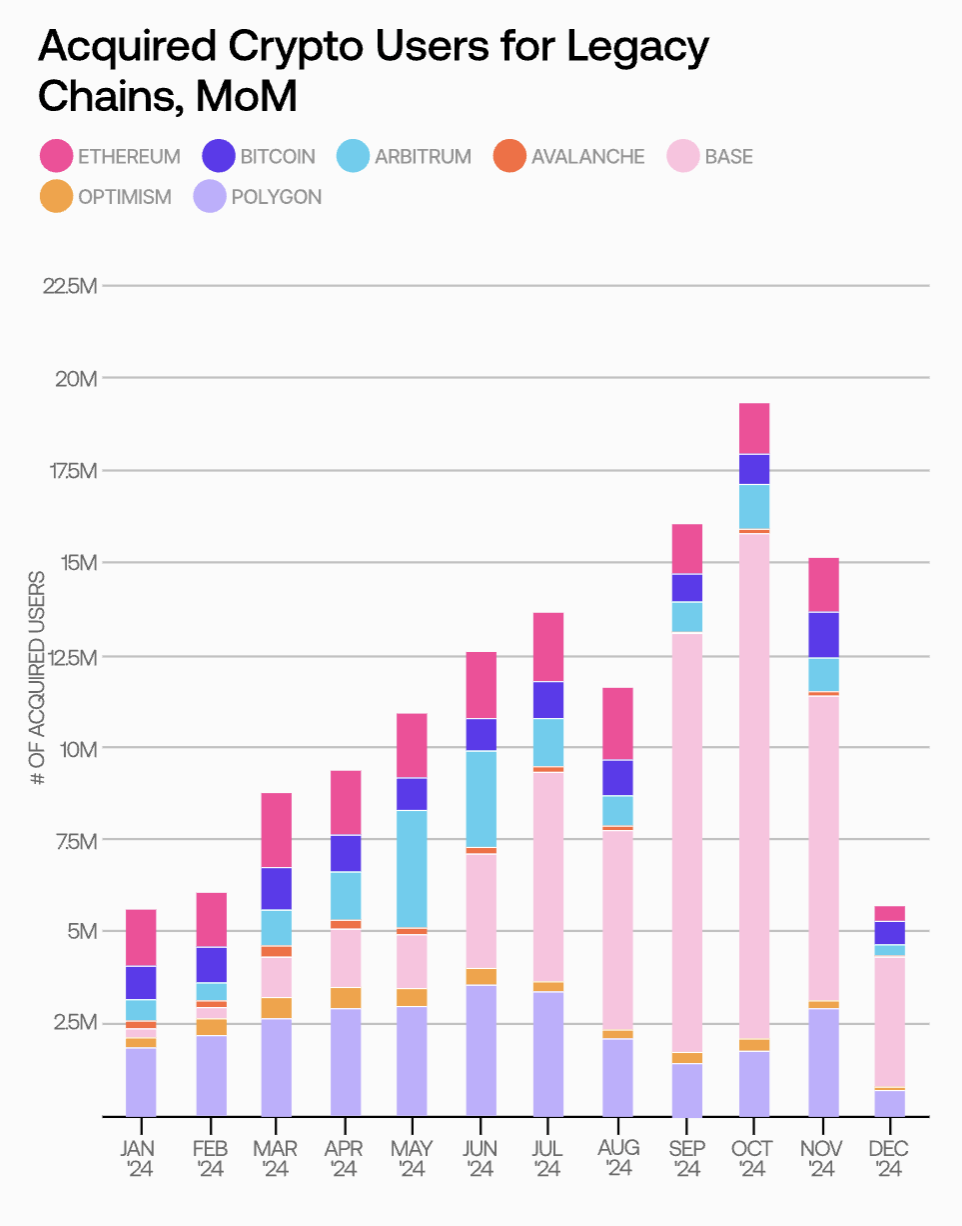
This sustained growth may be influenced by increased institutional crypto adoption, as evidenced by the series of BTC and ETH ETF announcements earlier this year.
Other exciting developments in the first half of 2024, such as Grayscale listing several new crypto assets as "under consideration" and the Federal Open Market Committee (FOMC) cutting US interest rates by 50 basis points in September 2024 - the first rate cut in four years - may have also contributed to this optimistic sentiment.
Base's Remarkable Growth
Base started the year slowly, but its monthly new user acquisition has exploded 56-fold since January.
Base had only 244,700 new users in January, but experienced steady and significant growth throughout the year. By November, the chain's monthly new user count had grown 56-fold compared to January, averaging 4.7 million new users per month in 2024.
The chain's performance has greatly benefited from Coinbase's massive user base, collectively controlling around $130 billion in assets. Popular DeFi protocols like Aerodrome may have also attracted users from other EVM chains, while Base has successfully driven user interest in meme coin trading and on-chain AI (like the new Based Agents program).
Bitcoin's Performance
Despite BTC price hitting new highs, it did not attract a significant influx of new users this year.
Bitcoin's new user acquisition remained relatively flat in 2024, despite the substantial price appreciation. Overall, Bitcoin's monthly new user growth averaged 935,900, ranking third-to-last among the seven traditional public chains observed in this report.
This suggests that the rise in BTC price was primarily driven by speculation and enthusiasm among its existing user base, rather than substantial new user onboarding.
In March 2024, when BTC saw its first major price surge, it coincided with a 19.2% quarter-over-quarter increase in new user acquisition. However, in November - when BTC reached the long-awaited $100,000 milestone amid continued price appreciation - new user acquisition actually declined 28.5% quarter-over-quarter.
Ethereum and L2s Performance
Ethereum's new user acquisition overall outpaced its traditional L2s, but Arbitrum also saw an impressive single-month growth.
Ethereum's growth outpaced its two leading L2 chains in 2024, averaging 1.56 million new users per month, compared to 1.2 million for Arbitrum and 348,800 for Optimism. Excluding December, Ethereum only saw four months of quarter-over-quarter declines, and reached a single-month peak of 1.9 million new users in March - a 33.4% increase.
Arbitrum and Optimism both started the year with strong momentum, reaching their 2024 new user growth peaks in April and May respectively, before tapering off for the rest of the year.
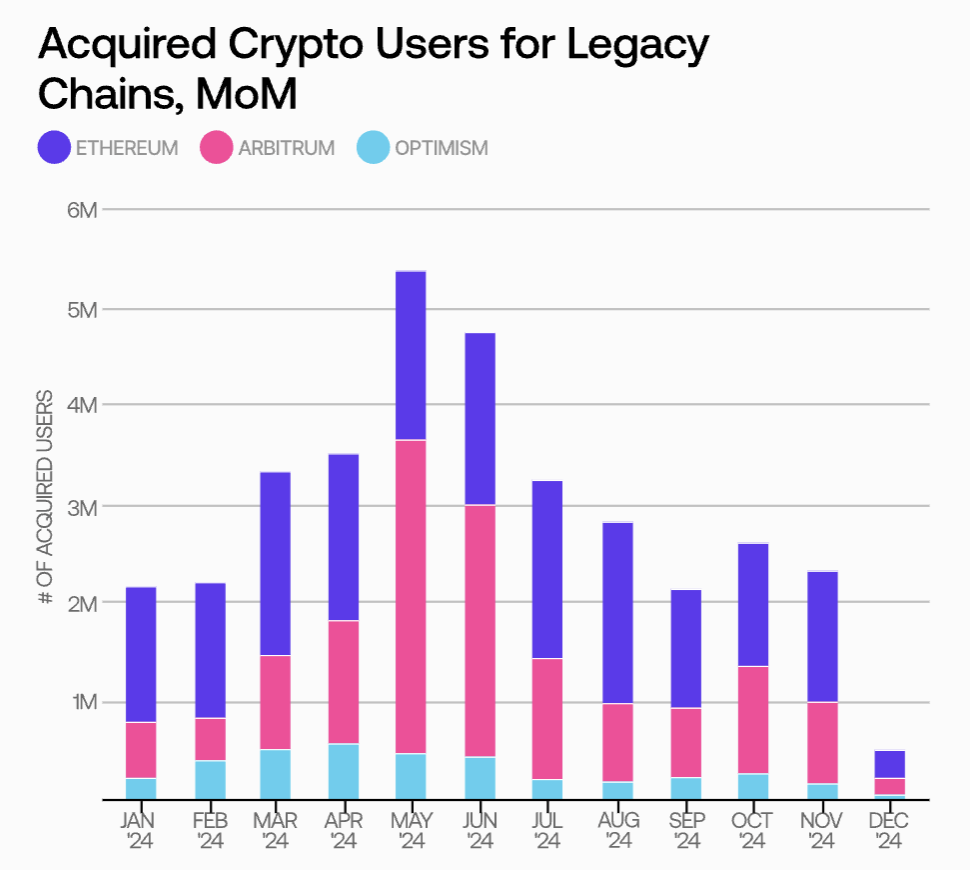
However, it's worth noting that Arbitrum's 3.3 million new users in May exceeded Ethereum's highest single-month peak in 2024. In this context, Arbitrum's new user growth has outpaced Optimism throughout the year, benefiting from the success of Arbitrum One and the integration and expansion of GameFi and SocialFi. With 169 builder grants approved in the first half of 2024 and many behind-the-scenes developments, it remains to be seen whether Arbitrum can reclaim its position as the leading global EVM L2.
Performance of New Public Chains in 2024
Among the public chains launched in 2024, Aleo achieved the highest average new user growth, while Blast saw a record single-month peak before tapering off.
For the new public chains, in their launch months, Aleo had the highest new user growth, averaging 175,200 new users, compared to 134,900 for Blast and 90,700 for Sei. This can be attributed to Blast's sharp user acquisition decline starting in July, as well as Sei's slow start - despite launching its mainnet months earlier, it only reached a peak of 324,500 new users in October.
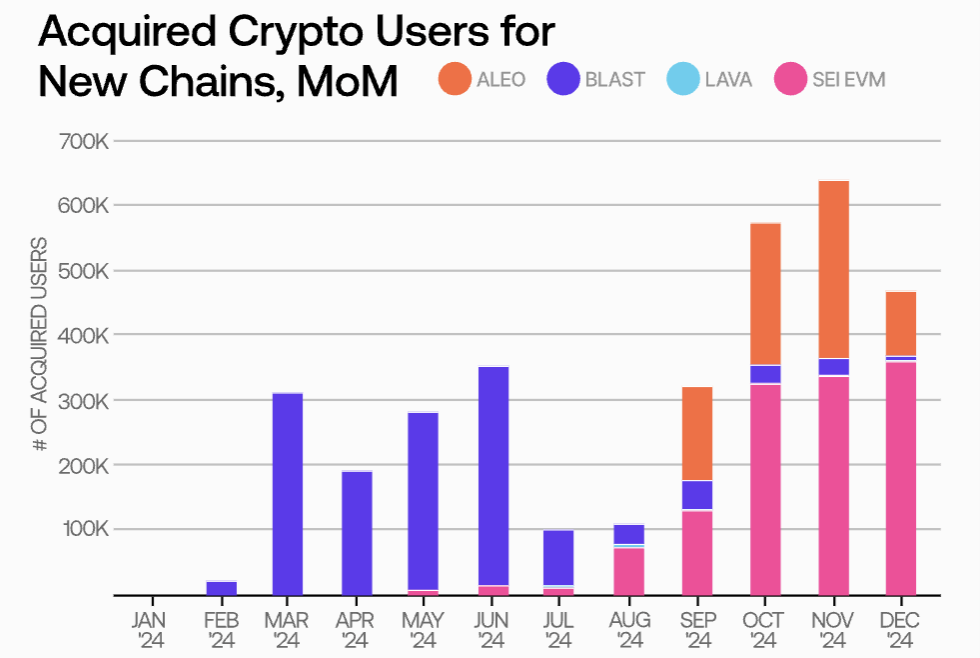
It is still unclear whether these public chains will regain growth momentum by 2025 - especially considering that Base also experienced a similar post-launch cooling period before its exponential surge in 2024. Among the four new public chains being tracked, Lava's performance has been overshadowed by its competitors so far, and although Blast recorded the highest monthly user growth among the newly launched public chains in June, it still has a long way to go.
3. Super Users
As of December 2024, Base had the most DeFi-related super users, with 15.1 million wallets executing 100 or more transactions.
In addition to gaining the most new users, Base also attracted the largest number of DeFi-related super users, with the number of users executing 100 or more transactions being 38.4% more than the second-ranked Ethereum. Closely following are Ethereum's 10.7 million new super users and Polygon's 7 million.
Note: "Super users" are defined as users who have executed at least 100 transactions on a given chain, regardless of the creation time of the relevant wallet or the time of the last transaction.
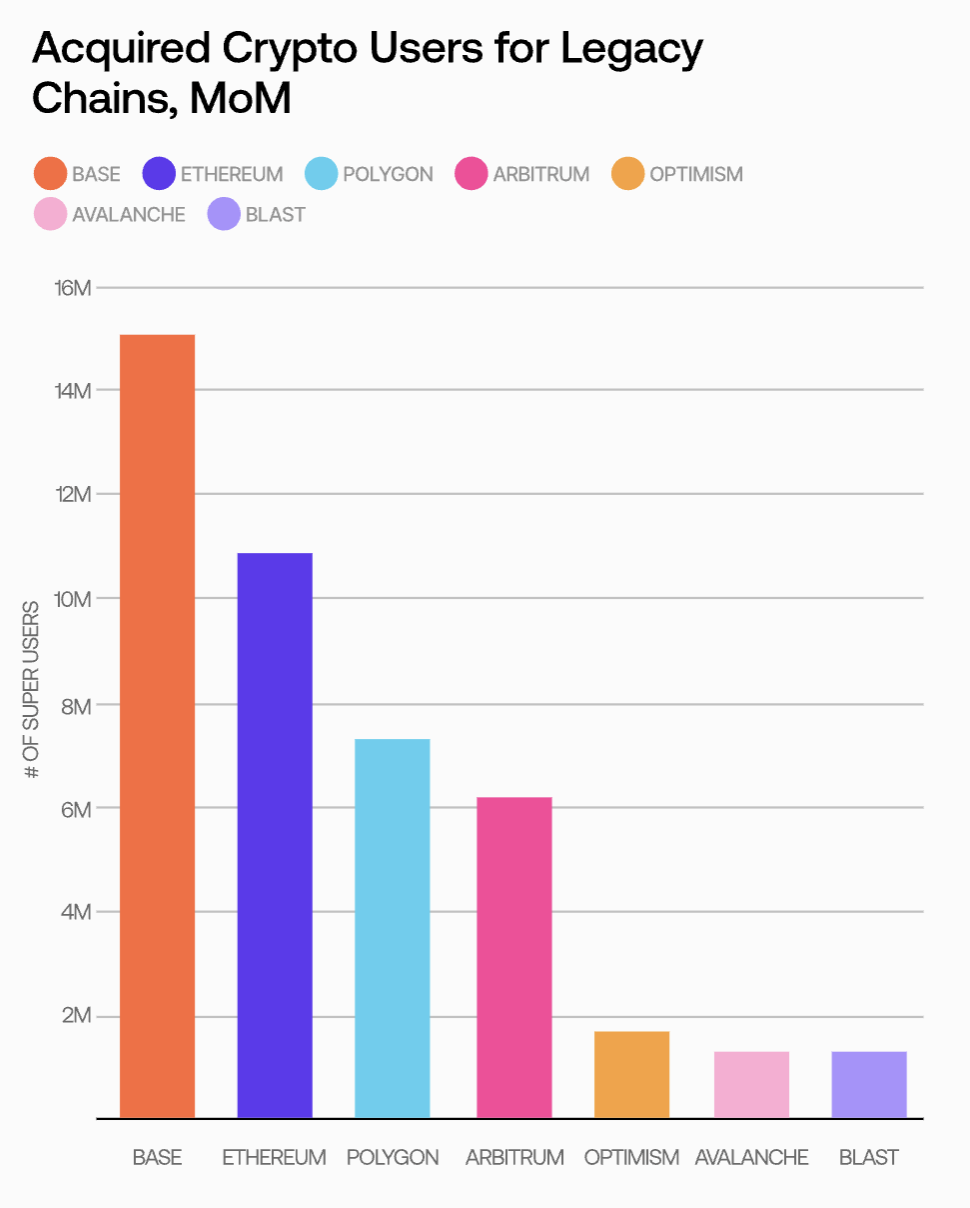
Given Base's explosive growth this year, its impressive super user numbers may not be surprising. This success is likely due to Base outperforming many traditional public chains in several hot areas this year, including but not limited to meme coins and NFT trading.
At the other end, Avalanche and Blast had similar super user numbers this year, averaging around 1.3 million, while Optimism performed slightly better with 1.7 million users making at least 100 DeFi transactions.
Polygon's Outstanding Performance
Polygon added the most new super users this year and continued to stand out in non-DeFi-related super user activity.
Polygon has attracted 1.5 million new super users in 2024 so far - nearly double the second-ranked Base.
Polygon's super user activity also surpassed all other observed public chains, with an average of 86.77 million super user transactions per month this year. In addition to Base's impressive 78.63 million super user transactions, Arbitrum also performed strongly in 2024, reaching 36.53 million super user transactions.
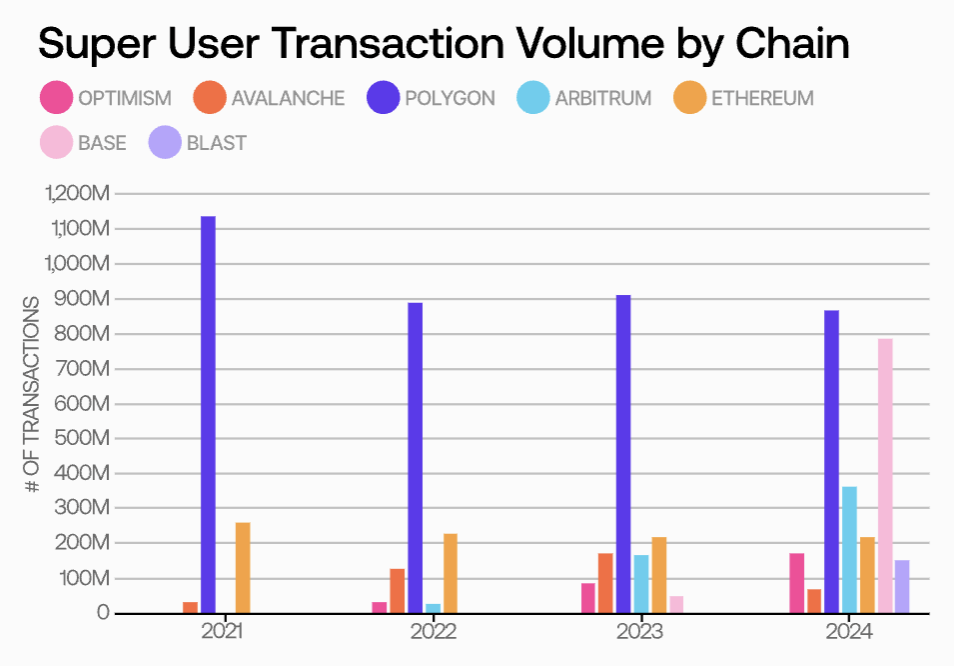
Polygon's outstanding performance has continued its long-standing leadership in super user activity since 2021. In 2021, Polygon's transaction volume reached 1.14 billion, setting the highest record for super user activity across all blockchains, and has maintained this position.
However, despite Polygon having the highest super user activity among all blockchains, its number of DeFi (Decentralized Finance)-related super user wallets ranks only third. This suggests that Polygon has successfully attracted a large number of high-frequency trading users through GameFi (Blockchain-based Gaming Finance) and other application scenarios, not just relying on DeFi applications.
Ethereum's super user numbers in the DeFi domain exceed the total of Arbitrum and Optimism.
As of 2024, Ethereum has reached 10.9 million super users in the DeFi domain, second only to Base. This figure is far higher than the combined total of Arbitrum (6.2 million) and Optimism (1.8 million).
While EVM L2 (Ethereum Virtual Machine-compatible Layer 2 networks) generally have faster speeds and lower transaction costs, many users may still find cross-chain asset bridging too complex or risky, or may prefer to use the Ethereum mainnet due to its deeper liquidity and more mature market position.
However, Ethereum's Layer 2 networks need to further explore ways to attract users beyond just relying on their performance advantages over the Ethereum mainnet.
4. DEX Users
Uniswap has continued to expand its market share across major blockchains, further consolidating its position as the leader in the decentralized exchange (DEX) domain.
Uniswap remains the undisputed number one in all observed chains, with the exception of Avalanche and Blast. Particularly on the Base chain, Uniswap's user share has soared from 36.8% to 91.3%. Given the exponential growth of Base chain users this year, this achievement is particularly noteworthy.
Similarly, Uniswap's performance on other major chains has also improved. Compared to 2023, its DEX activity share on Ethereum grew by 27.72%, while on Polygon it grew by 12.57%. It is worth noting that Polygon's DEX activity distribution has always been more diversified, with its user base's trading behavior being more varied compared to other leading chains.
Even without considering Uniswap's protocol upgrades, this phenomenon may also reflect a "winner-takes-all" trend in the DeFi domain, where larger platforms occupy a greater market share due to their deep liquidity and brand recognition.
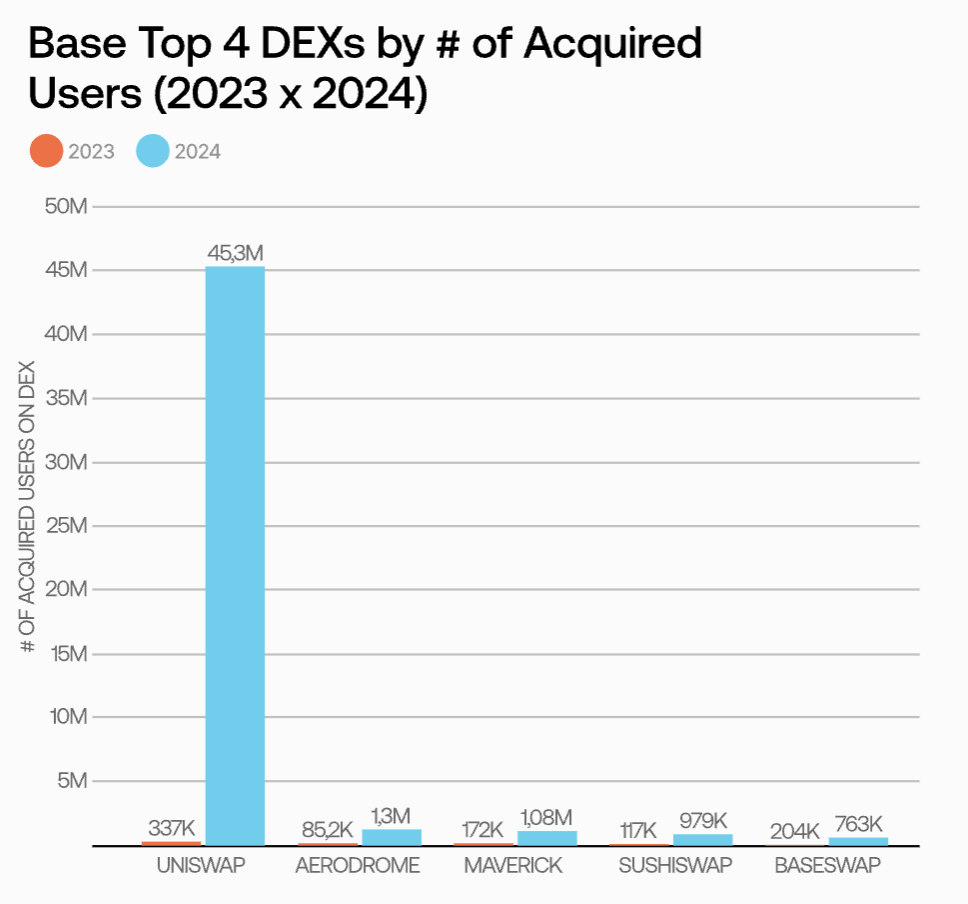
On Avalanche, Trader Joe has further consolidated its leading position, while Uniswap's ranking has also risen.
Uniswap has now become the second most popular DEX on Avalanche, whereas in 2023 it was not even in the top five. However, Trader Joe remains the most popular DEX on Avalanche, occupying 61.1% of the market share, and has increased its market share by about 6% since 2023.
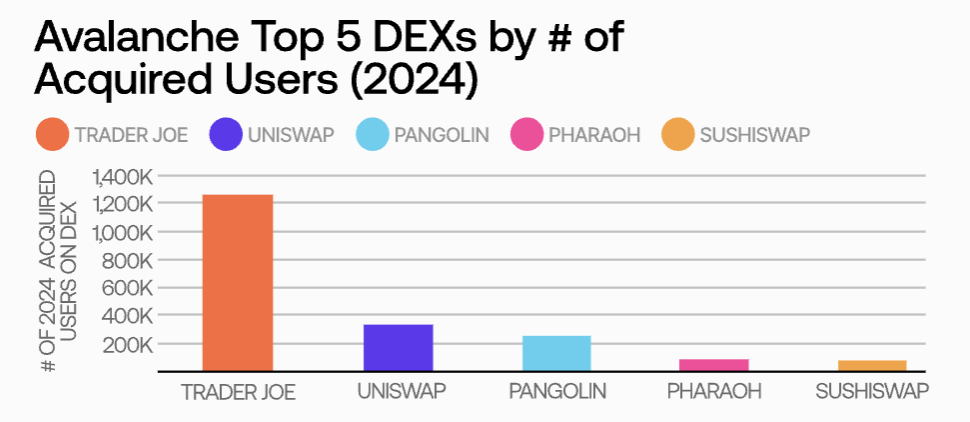
As the first native-built major DEX on Avalanche, Trader Joe has been committed to maintaining and expanding its market-leading position. The launch of the Auto-Pools feature in April this year has made it easier for liquidity providers (LPs) to automatically adjust their positions and compound their yields. Additionally, the platform supports liquidity staking for a variety of Avalanche assets and has actively expanded to new chains such as Arbitrum and BNB Chain, validating the viability of its unique Liquidity Book (LB) model.
The results show that Trader Joe's efforts have provided a successful case study for other platforms aspiring to establish a foothold in the competitive DEX market.
The preferences of super users and new users for DEXs are converging, but the distribution of super user trading activity remains more diversified.
Unlike 2023, the top three DEXs used by both super users and new users are now consistent across all observed chains. This suggests that new users have become more proficient at emulating the behavior of experienced traders, or that leading DEXs have found more effective ways to optimize their trading paths.
Nevertheless, super users' trading activity is still distributed across more DEXs, as they are more familiar with a wider range of DeFi protocols and are willing to explore opportunities beyond mainstream platforms like Uniswap to seek higher yields or unique trading conditions.
Looking Ahead: Opportunities and Challenges for Web3 in 2025
On-chain data shows that Web3 user numbers continued to grow in 2024, while traditional blockchains and new competitors face the challenge of standing out in the market and providing attractive use cases for both new and existing users. Furthermore, the rise in on-chain native token prices has not significantly driven diversified on-chain activity, and emerging DeFi protocols have faced considerable resistance in challenging existing giants.
Here are some key trends to look forward to in 2025:
Base as a Benchmark for Ecosystem Expansion
In 2024, Base became a model for attracting and retaining new users with its explosive user growth, providing a reference for other aspiring new blockchains. Base's success in meme coin trading and on-chain AI applications suggests that innovative use cases around hot topics will continue to drive user growth in 2025. However, how to convert these high-frequency trading activities into more sustainable and diversified user engagement remains an important challenge.
Ethereum User Growth Brings New Opportunities for L2 Chains
Although Ethereum's Layer 2 networks (L2s) generally have performance advantages, Ethereum's massive user base and liquidity still place it at the core of the Web3 economy. L2 chains like Optimism may further adjust their strategies to attract Ethereum's growing mainstream users and guide them into their own chain ecosystems.
Differentiation or Economies of Scale are Key to Success
Here is the English translation of the text, with the terms in <> retained and not translated: Uniswap's market dominance is growing, indicating a "winner-takes-all" trend in the DeFi market. However, chains like Avalanche and Polygon have proven that targeted innovation can establish a significant position in specific markets. For example, Trader Joe's Auto-Pools feature has simplified the operations for liquidity providers, while Polygon's GameFi projects have attracted a large number of gamers. Looking ahead to 2025, protocols that can provide differentiated on-chain services and go beyond traditional DeFi functionalities are more likely to attract market attention. As new users continue to join, blockchain ecosystem builders need to find ways to incentivize users to participate in more diverse activities, such as governance voting and staking, rather than just trading. With the rapid growth in wallet numbers, chains that prioritize user quality and promote diverse participation will have an advantage in the long-term health of their ecosystems. As 2025 approaches, the Web3 industry faces an important challenge: how to distinguish short-term active phenomena from truly sustainable growth. While the surge in new users and transaction volumes in 2024 has brought an optimistic outlook for the industry, the key question is whether these users will remain long-term and contribute to the long-term development of the blockchain ecosystem. Flipside Scores are designed to address this issue. Flipside Scores quantify the quality of user on-chain activities by integrating 15 performance metrics across five categories. Unlike simple metrics based solely on transaction volume, this approach can comprehensively reflect the breadth and depth of user activities, revealing which ecosystems are performing well and where there is room for improvement. Overall, in 2024, as the number of wallets and on-chain transaction volumes surged, the user quality of various chains declined. This phenomenon reflects that the industry has attracted a large number of new users, whose current level of participation is relatively low, but who have the potential to gradually explore the diverse use cases provided by Web3 in the future. Here are some key findings: : One of the typical success cases in user growth in 2024. Although the user quality score of this chain is relatively low, this does not mean that Base's overall performance is poor. On the contrary, it indicates that its large new user base is currently focused on a limited number of on-chain activities, and Base still has significant room for improvement by guiding these users to participate in more diverse ecosystem activities. : User quality declined significantly before the SEC-approved ETH ETFs were listed. This suggests that while the influx of institutional capital can drive rapid growth in wallet numbers, if there are insufficient incentive mechanisms and convenient participation channels (such as protocol governance), the depth of user on-chain activities may be difficult to improve. : Successfully attracted users to actively participate in multiple on-chain activities in the early stages, demonstrating its strong capabilities in incentivizing gamified activities. Although Blast's user growth slowed down in Q4 2024, the remaining users remain active in multiple areas, indicating that the chain is likely to exceed the initial hype and achieve long-term development.








